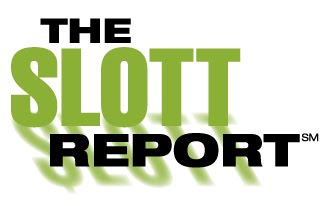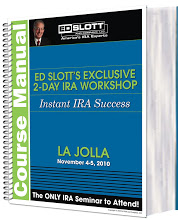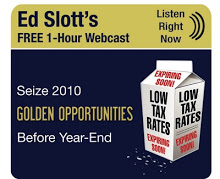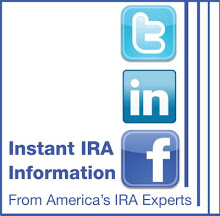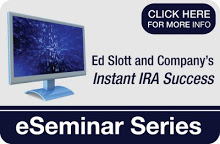The bankruptcy reform act passed in 2006 gave all IRAs a $1,000,000 exemption if you are using the federal bankruptcy rules. In addition, funds from employer plans were 100% exempted, even if they were rolled over to an IRA. So, your IRA funds should be exempt, right?
The answer is a definite maybe. In Bankruptcy Court, you might get asked about transactions you have done in your IRA or in your employer plan. And, if the Court determines that your transactions violate the prohibited transaction rules, you would lose your exemption in the bankruptcy proceedings.
This is exactly what happened to Ernest Willis last year. Fourteen years prior to the bankruptcy action, he had taken a distribution from his IRA, used it to pay off a mortgage, and replaced the funds in his IRA right about the 60 day mark. The Bankruptcy Court determined that as of that point he no longer had an IRA since he had “borrowed” from it which is a prohibited transaction.
Is this decision correct? Courts are involved in interpreting the tax code every day. Bankruptcy Court is no different. This is not the first court to come to this conclusion regarding retirement plans and creditors. On the other hand, through the Private Letter Rule process, IRS rules on hundreds of 60-day rollovers each year. When they deny a 60-day rollover request they may say that the request is not granted because the funds were used as a short term interest free loan but they never say that this is a prohibited transaction. In fact, there is at least one PLR that says that the account owner can use the funds for any purpose whatsoever while they are out of the IRA. (“… an individual is entitled to withdraw funds from an IRA for personal use and have it considered a rollover as long as the amount is redeposited back into the same IRA or into another qualified IRA within 60 days.” PLR 9010007) We will have to watch for further developments.
By IRA Technical Consultant Beverly DeVeny and Jared Trexler
------------------------------------------------------------------------------
Comment, Question, Discussion Topic on your mind? Click on the Blue Comment Link below and leave your thoughts then check back to see what other consumers and advisors think.
*Copyright 2010 Ed Slott and Company, LLC
Wednesday, March 31, 2010
Tuesday, March 30, 2010
Retirement Fears: Roth IRAs for Kids
Parents want the best for their children. The best education. The best clothing. The nice (but not too nice) first car. They also want to provide all available tools to help their children succeed past childhood and into adulthood.
A major part of that is financial security, and with the ever-growing popularity of Roth IRAs, parents are beginning to ask questions about opening them for their children.
You NEED to know the basics to stay away from a Retirement Fear.
Monday, March 29, 2010
Ed Slott on the Road: Week of March 29th
Ed Slott will be traveling just once with week because of Passover, heading out to Round Hill Country Club in Alamo, California to speak to Transamerica on Thursday, April 1.
As always, if your company is interested in bringing Ed Slott in to speak, please contact Laurin Levine at 516-536-8282.
As always, if your company is interested in bringing Ed Slott in to speak, please contact Laurin Levine at 516-536-8282.
Friday, March 26, 2010
Discussion Forum Question of the Week
This week the Ed Slott and Company IRA Discussion Forum featured a question about how inherited IRAs can affect estate taxes of the beneficiary. Want to know the answer? Read on to find out…
Once an IRA owner has died, the beneficiary of that IRA becomes the rightful owner of the property. As such, when the beneficiary dies, any remaining value in the inherited IRA would be included in their gross estate for the purpose of calculating the estate tax.
But how can you move your IRA (or an inherited IRA) out of your estate to help reduce or avoid potential future estate taxes? YOU CAN’T!!!!
The “I” in IRA stands for “individual,” so as you might imagine, only an individual can own an IRA. This is just one of the many reasons IRAs are different from nearly all other types of assets.
Other property, such as life insurance policies, real estate and even your everyday stocks and bonds can be gifted to trusts that remove them from being included in the value of a person’s estate at their death. But the same cannot be done with IRAs.
“Moving” an IRA into a trust - any trust - and for any reason - is NOT possible. In fact, this is one of the more costly errors that a person can make. Once the IRA funds are distributed (moved) to the trust account, the IRA ceases to exist and the entire distribution is taxable.
Considering estate planning? Remember that IRAs are different. If an IRA is an important part of your estate, make sure to speak with a planner who has specialized knowledge in this area.
Got more questions?? Want to see what other people are asking? Check out the Ed Slott and Company IRA Discussion Forum.
By IRA Technical Consultant Jeffrey Levine and Jared Trexler
------------------------------------------------------------------------------
Comment, Question, Discussion Topic on your mind? Click on the Blue Comment Link below and leave your thoughts then check back to see what other consumers and advisors think.
*Copyright 2010 Ed Slott and Company, LLC
Once an IRA owner has died, the beneficiary of that IRA becomes the rightful owner of the property. As such, when the beneficiary dies, any remaining value in the inherited IRA would be included in their gross estate for the purpose of calculating the estate tax.
But how can you move your IRA (or an inherited IRA) out of your estate to help reduce or avoid potential future estate taxes? YOU CAN’T!!!!
The “I” in IRA stands for “individual,” so as you might imagine, only an individual can own an IRA. This is just one of the many reasons IRAs are different from nearly all other types of assets.
Other property, such as life insurance policies, real estate and even your everyday stocks and bonds can be gifted to trusts that remove them from being included in the value of a person’s estate at their death. But the same cannot be done with IRAs.
“Moving” an IRA into a trust - any trust - and for any reason - is NOT possible. In fact, this is one of the more costly errors that a person can make. Once the IRA funds are distributed (moved) to the trust account, the IRA ceases to exist and the entire distribution is taxable.
Considering estate planning? Remember that IRAs are different. If an IRA is an important part of your estate, make sure to speak with a planner who has specialized knowledge in this area.
Got more questions?? Want to see what other people are asking? Check out the Ed Slott and Company IRA Discussion Forum.
By IRA Technical Consultant Jeffrey Levine and Jared Trexler
------------------------------------------------------------------------------
Comment, Question, Discussion Topic on your mind? Click on the Blue Comment Link below and leave your thoughts then check back to see what other consumers and advisors think.
*Copyright 2010 Ed Slott and Company, LLC
Thursday, March 25, 2010
Photos From Orlando
To give you a sense of the 2-Day IRA Workshop experience, we took some photos when the workshop was in session and during networking and sponsor breaks at the most recent Instant IRA Success event in Orlando, Florida on March 19-20.
To view the pictures, click on The Facebook badge down the left-side of this page and log-in to your Facebook account or Friend "Ed Slott" on Facebook to view the pictures and get the latest IRA and company information.
To view the pictures, click on The Facebook badge down the left-side of this page and log-in to your Facebook account or Friend "Ed Slott" on Facebook to view the pictures and get the latest IRA and company information.
Slott Report Mailbag: March 25th
Below is another edition of The Slott Report Mailbag with 3 questions and our answers. Spring is here, and people are ready to send time outdoors on vacations or simple weekend getaways with friends and family. Financial security brings comfort this time of year as people want to concentrate on relationships with friends and family.
Read the questions and answers below!
1.
Dear Mr. Slott and Company,
I recently came into a little money from a fall I took in 2009. This is all the savings I have. I am 63 years old and single. My credit is not very good. I need to get a car and the rest of the money I would like to know what to do with so I will have something to leave my three grandchildren. I get social security and work 14 hours a week. What do you suggest?
Answer:
We get these questions a lot, and we suggest you consult a financial advisor to help you with your financial advisors. CLICK HERE to find a financial advisor that trains with us!
An advisor would be able to help you structure your assets to best benefit you now and your grandchildren at your death.
2.
Dear Ed and Company,
I am 56 years old and may have to take early retirement. My wife works and I am expecting a buyout from my company that can keep me going for more than a year if needed. I expect to get some kind of job even if it is in retail so I don't have to cut into my $525,000 pension and $400,000 401(k). My question is: Can I rollover into an IRA now and use the 72(t) rule when I am 58 if I need to? Or can I just leave the 401(k) money at my place of employment until I feel more at ease to roll that over?
Thank you for considering my questions.
Joseph Cozza
Answer:
There is a special rule that would allow you to withdraw money from your 401(k) plan if you are age 55 or older, versus age 59 1/2 for IRAs, without penalty. In order to qualify there must be what is called a "triggering event". In you situation, termination of employment is the the "triggering event". If this works, you can take out enough money to live on over the next several years out of the plan and the remainder can later be rolled over into an IRA. There is no specific time period that the money must come out of the 401(k) plan. However, you must check the plan to see i the plan provides a specific time period that the money must come out. If the money can stay in, you also want to check if the plan allows discretionary distributions. Also, if your 401(k) plan holds any of your employer stock, you may be entitled to a special tax benefit when you take the funds out of the plan.
If you do an IRA rollover and use the 72(t) exemption you will be locked into taking distributions for the later of age 59 1/2 or 5 years.
As you can probably tell by now, this is an important and complicated decision. We would recommend you consult with your tax and/or financial advisor.
3.
Dear Ed,
My husband and I both have Roth IRAs with our 17-year-old granddaughter (only grandchild) as our beneficiary. We not not, nor do we intend to, make any withdrawals from the IRAs (I am 76 and my husband is 78).
Although we have a family living trust, our IRAs are not included. We put them into the Surles Retirement Living Trust for our granddaughter, with our son as the trustee. Are we creating any problems, or did we make a mistake in doing this?
Thank you,
Marcy Surles
Answer:
You cannot put your Roth IRA, or any other IRA, into a trust. An IRA is an individual retirement account and it cannot be assigned or transferred during lifetime. You can, however, name a trust as beneficiary of your Roth IRA. Naming a trust as beneficiary must be done very carefully. There are many rules that must be followed to insure that you are taking full advantage of the IRA benefits, including tax benefits. You would certainly want the Roth IRA to go to your grandchild in a most tax-efficient manner. We would suggest you consult with a knowledgeable financial advisor with expertise in IRAs and trusts.
By IRA Technical Consultant Marvin Rotenberg and Jared Trexler
------------------------------------------------------------------------------
Comment, Question, Discussion Topic on your mind? Click on the Blue Comment Link below and leave your thoughts then check back to see what other consumers and advisors think.
*Copyright 2010 Ed Slott and Company, LLC
Read the questions and answers below!
1.
Dear Mr. Slott and Company,
I recently came into a little money from a fall I took in 2009. This is all the savings I have. I am 63 years old and single. My credit is not very good. I need to get a car and the rest of the money I would like to know what to do with so I will have something to leave my three grandchildren. I get social security and work 14 hours a week. What do you suggest?
Answer:
We get these questions a lot, and we suggest you consult a financial advisor to help you with your financial advisors. CLICK HERE to find a financial advisor that trains with us!
An advisor would be able to help you structure your assets to best benefit you now and your grandchildren at your death.
2.
Dear Ed and Company,
I am 56 years old and may have to take early retirement. My wife works and I am expecting a buyout from my company that can keep me going for more than a year if needed. I expect to get some kind of job even if it is in retail so I don't have to cut into my $525,000 pension and $400,000 401(k). My question is: Can I rollover into an IRA now and use the 72(t) rule when I am 58 if I need to? Or can I just leave the 401(k) money at my place of employment until I feel more at ease to roll that over?
Thank you for considering my questions.
Joseph Cozza
Answer:
There is a special rule that would allow you to withdraw money from your 401(k) plan if you are age 55 or older, versus age 59 1/2 for IRAs, without penalty. In order to qualify there must be what is called a "triggering event". In you situation, termination of employment is the the "triggering event". If this works, you can take out enough money to live on over the next several years out of the plan and the remainder can later be rolled over into an IRA. There is no specific time period that the money must come out of the 401(k) plan. However, you must check the plan to see i the plan provides a specific time period that the money must come out. If the money can stay in, you also want to check if the plan allows discretionary distributions. Also, if your 401(k) plan holds any of your employer stock, you may be entitled to a special tax benefit when you take the funds out of the plan.
If you do an IRA rollover and use the 72(t) exemption you will be locked into taking distributions for the later of age 59 1/2 or 5 years.
As you can probably tell by now, this is an important and complicated decision. We would recommend you consult with your tax and/or financial advisor.
3.
Dear Ed,
My husband and I both have Roth IRAs with our 17-year-old granddaughter (only grandchild) as our beneficiary. We not not, nor do we intend to, make any withdrawals from the IRAs (I am 76 and my husband is 78).
Although we have a family living trust, our IRAs are not included. We put them into the Surles Retirement Living Trust for our granddaughter, with our son as the trustee. Are we creating any problems, or did we make a mistake in doing this?
Thank you,
Marcy Surles
Answer:
You cannot put your Roth IRA, or any other IRA, into a trust. An IRA is an individual retirement account and it cannot be assigned or transferred during lifetime. You can, however, name a trust as beneficiary of your Roth IRA. Naming a trust as beneficiary must be done very carefully. There are many rules that must be followed to insure that you are taking full advantage of the IRA benefits, including tax benefits. You would certainly want the Roth IRA to go to your grandchild in a most tax-efficient manner. We would suggest you consult with a knowledgeable financial advisor with expertise in IRAs and trusts.
By IRA Technical Consultant Marvin Rotenberg and Jared Trexler
------------------------------------------------------------------------------
Comment, Question, Discussion Topic on your mind? Click on the Blue Comment Link below and leave your thoughts then check back to see what other consumers and advisors think.
*Copyright 2010 Ed Slott and Company, LLC
Wednesday, March 24, 2010
Ed Slott In The News
Ed Slott needed to settle an incorrect notion -- and he did so with vigor.
Humberto Cruz talked about the following misconception in a March 18th column:
A dozen readers 70 1/2 and older have written to say their financial advisers recommended they convert their entire traditional IRAs to Roth IRAs this year. By converting everything, the advisers said, they wouldn't have to take the required minimum distributions from their traditional IRAs for 2010.
The problem is that the belief is unfounded.
"It's absolutely not true," Slott said. Once individuals turn 70 1/2, traditional IRA holders must start withdrawing a minimum amount each year. The distribution MUST be taken before any remaining funds can be converted to a Roth IRA.
CLICK HERE to read Cruz's column titled, "Bad advice abounds on Roth IRA conversions".
--------------------
In a March 20th article on Dailyfinance.com, Jean Chatzky asks the rhetorical, albeit extremely important question, "Will a Roth IRA Conversion Boost Your Nest Egg?"
One of the key questions to ask is, "Who should convert?" Ed Slott answers that in Chatzky's piece.
"Older people--if their 70's or older I would say--if they're converting, they don't have the life expectancy to make the cost worth the benefit. So this isn't for them, unless they are doing it for estate-planning purposes, because then their kids or grandkids can have the money tax-free."
CLICK HERE to read Chatzky's article in its entirety.
Humberto Cruz talked about the following misconception in a March 18th column:
A dozen readers 70 1/2 and older have written to say their financial advisers recommended they convert their entire traditional IRAs to Roth IRAs this year. By converting everything, the advisers said, they wouldn't have to take the required minimum distributions from their traditional IRAs for 2010.
The problem is that the belief is unfounded.
"It's absolutely not true," Slott said. Once individuals turn 70 1/2, traditional IRA holders must start withdrawing a minimum amount each year. The distribution MUST be taken before any remaining funds can be converted to a Roth IRA.
CLICK HERE to read Cruz's column titled, "Bad advice abounds on Roth IRA conversions".
--------------------
In a March 20th article on Dailyfinance.com, Jean Chatzky asks the rhetorical, albeit extremely important question, "Will a Roth IRA Conversion Boost Your Nest Egg?"
One of the key questions to ask is, "Who should convert?" Ed Slott answers that in Chatzky's piece.
"Older people--if their 70's or older I would say--if they're converting, they don't have the life expectancy to make the cost worth the benefit. So this isn't for them, unless they are doing it for estate-planning purposes, because then their kids or grandkids can have the money tax-free."
CLICK HERE to read Chatzky's article in its entirety.
IRA Updates -- Recent Tax Law Changes
It is nearly the end of March and we now have a health care bill and a jobs stimulus bill. Way to go Congress! But we are still waiting for word on the estate tax exemption which Congress let expire as of December 31, 2009 as well as other tax provisions that expired.
The latest word on the estate tax exemption is that Congress will take that up as soon as the Easter recess is over if they have not managed to deal with the issue before the recess. It is expected that the $3,500,000 exemption amount will be resurrected and that the top tax rate will remain at 45% for 2010 and going forward. We will keep you posted on this one.
The Qualified Charitable Distribution which also expired - again - on December 31, 2009 is slated to be extended for another year. This is included in legislation that has passed both Houses in slightly different versions and will now go to a Conference Committee for reconciliation. Again, we will keep you posted. But wouldn’t it be nice if Congress would just take a stand on this issue and either make it permanent or let it expire for good?
Good news for taxpayers residing in Wisconsin. As of March 15th, the tax law for Roth conversions has now been changed to conform to federal tax law. Residents with income over $100,000 can now do Roth conversions and not face state penalties.
By IRA Technical Consultant Beverly DeVeny and Jared Trexler
------------------------------------------------------------------------------
Comment, Question, Discussion Topic on your mind? Click on the Blue Comment Link below and leave your thoughts then check back to see what other consumers and advisors think.
*Copyright 2010 Ed Slott and Company, LLC
The latest word on the estate tax exemption is that Congress will take that up as soon as the Easter recess is over if they have not managed to deal with the issue before the recess. It is expected that the $3,500,000 exemption amount will be resurrected and that the top tax rate will remain at 45% for 2010 and going forward. We will keep you posted on this one.
The Qualified Charitable Distribution which also expired - again - on December 31, 2009 is slated to be extended for another year. This is included in legislation that has passed both Houses in slightly different versions and will now go to a Conference Committee for reconciliation. Again, we will keep you posted. But wouldn’t it be nice if Congress would just take a stand on this issue and either make it permanent or let it expire for good?
Good news for taxpayers residing in Wisconsin. As of March 15th, the tax law for Roth conversions has now been changed to conform to federal tax law. Residents with income over $100,000 can now do Roth conversions and not face state penalties.
By IRA Technical Consultant Beverly DeVeny and Jared Trexler
------------------------------------------------------------------------------
Comment, Question, Discussion Topic on your mind? Click on the Blue Comment Link below and leave your thoughts then check back to see what other consumers and advisors think.
*Copyright 2010 Ed Slott and Company, LLC
Tuesday, March 23, 2010
Ed Slott on the Road: Week of March 22nd
Ed Slott has returned from a successful 2-Day IRA Workshop and will be conducting a pair of speaking events this week.
CLICK HERE to view Ed's entire speaking schedule. If you are interested in having Ed speak to your company, please contact Laurin Levine at 516-536-8282.
- Ed will be speaking to Transamerica on Tuesday, March 23rd at the Marriott Bridgewater in Bridgewater, New Jersey
- Ed will be speaking to Transamerica on Thursday, March 25th at the Abbington Banquets in Glen Ellyn, Illinois
CLICK HERE to view Ed's entire speaking schedule. If you are interested in having Ed speak to your company, please contact Laurin Levine at 516-536-8282.
Monday, March 22, 2010
Next 2-Day IRA Workshop in La Jolla
Ed Slott's NEXT 2-Day IRA Workshop, Instant IRA Success, will take place at the Hyatt Regency La Jolla in La Jolla, California on November 4-5.
It is never too early to register. Save your clients' nest eggs TODAY--NOT TOMORROW--with essential information from America's IRA Experts.
CLICK on the La Jolla banner at the top of the page, or CLICK HERE for more information and to register.
Don't forget to tell your colleagues! You both will receive a $100 DISCOUNT if you attend together.
It is never too early to register. Save your clients' nest eggs TODAY--NOT TOMORROW--with essential information from America's IRA Experts.
CLICK on the La Jolla banner at the top of the page, or CLICK HERE for more information and to register.
Don't forget to tell your colleagues! You both will receive a $100 DISCOUNT if you attend together.
Senate Passes Extenders Bill
By a vote of 62-36, the Senate on March 10, 2010 passed the American Workers, State & Business Relief Act of 2010. The bill includes a combination of tax-extenders (items that expired in a previous year but are up for renewal in 2010), energy provisions and incentives for businesses. It will now be sent to a Conference Committee to reconcile the differences between the House and Senate versions of the bill.
A package of approximately 40 tax extenders has been included in the bill, seven of which directly affect charity and charitable giving. If the bill is passed, it is anticipated that these provisions will be effective retroactively to January 1, 2010 and run through December 31, 2010, in other words, for one year only.
IRA charitable rollovers, born of the Pension Protection Act of 2006, were originally in effect from August 17, 2006 - December 31, 2007 and then extended for 2008 and 2009 via the Emergency Economic Stabilization Act of 2008. However, this provision was not extended prior to its expiration on December 31, 2009. Needless to say, charitable organizations are lobbying hard for the bill’s passage.
The provision will allow IRA owners and inheriting beneficiaries age 70 ½ or older to continue to make a “qualified charitable distribution” of up to $100,000 to an eligible charity directly from their IRAs. A husband and wife could each contribute up to a maximum of $100,000 provided they are made from the separate IRA of each person. Tax filing status is irrelevant, so even those married individuals who file separately could make use of this provision.
Eligible accounts will include Traditional IRAs and otherwise taxable dollars in Roth IRAs. Additionally, SEP IRAs and SIMPLE IRAs will qualify provided no current contributions are made to these accounts for the same tax year as the distribution to charity.
To qualify, the distribution from the IRA must go directly to a qualified charity (one that is not a supporting organization or donor advised fund). Fortunately, while required minimum distributions (RMDs) are back in 2010 for both IRA owners and beneficiaries after having been suspended in 2009, the IRA distribution to charity will count towards satisfying this requirement. Thus, individuals desiring to make a qualified charitable distribution from their IRAs in 2010 should delay taking their full RMD until the outcome of the bill is known. If the bill is passed, they would not pay any income tax on the amount going to charity nor would they receive a charitable income tax deduction. The fact that they don’t have to report the distribution as income is far better than a tax deduction.
While the House and Senate Conference Committee will need to come to an agreement on this bill, it is anticipated that “qualified charitable distributions” will be back in full force in 2010. Either way, we will keep you informed on the status of this bill as it progresses through the House and the Senate Conference Committee.
By IRA Technical Consultant Marvin Rotenberg and Jared Trexler
------------------------------------------------------------------------------
Comment, Question, Discussion Topic on your mind? Click on the Blue Comment Link below and leave your thoughts then check back to see what other consumers and advisors think.
*Copyright 2010 Ed Slott and Company, LLC
A package of approximately 40 tax extenders has been included in the bill, seven of which directly affect charity and charitable giving. If the bill is passed, it is anticipated that these provisions will be effective retroactively to January 1, 2010 and run through December 31, 2010, in other words, for one year only.
IRA charitable rollovers, born of the Pension Protection Act of 2006, were originally in effect from August 17, 2006 - December 31, 2007 and then extended for 2008 and 2009 via the Emergency Economic Stabilization Act of 2008. However, this provision was not extended prior to its expiration on December 31, 2009. Needless to say, charitable organizations are lobbying hard for the bill’s passage.
The provision will allow IRA owners and inheriting beneficiaries age 70 ½ or older to continue to make a “qualified charitable distribution” of up to $100,000 to an eligible charity directly from their IRAs. A husband and wife could each contribute up to a maximum of $100,000 provided they are made from the separate IRA of each person. Tax filing status is irrelevant, so even those married individuals who file separately could make use of this provision.
Eligible accounts will include Traditional IRAs and otherwise taxable dollars in Roth IRAs. Additionally, SEP IRAs and SIMPLE IRAs will qualify provided no current contributions are made to these accounts for the same tax year as the distribution to charity.
To qualify, the distribution from the IRA must go directly to a qualified charity (one that is not a supporting organization or donor advised fund). Fortunately, while required minimum distributions (RMDs) are back in 2010 for both IRA owners and beneficiaries after having been suspended in 2009, the IRA distribution to charity will count towards satisfying this requirement. Thus, individuals desiring to make a qualified charitable distribution from their IRAs in 2010 should delay taking their full RMD until the outcome of the bill is known. If the bill is passed, they would not pay any income tax on the amount going to charity nor would they receive a charitable income tax deduction. The fact that they don’t have to report the distribution as income is far better than a tax deduction.
While the House and Senate Conference Committee will need to come to an agreement on this bill, it is anticipated that “qualified charitable distributions” will be back in full force in 2010. Either way, we will keep you informed on the status of this bill as it progresses through the House and the Senate Conference Committee.
By IRA Technical Consultant Marvin Rotenberg and Jared Trexler
------------------------------------------------------------------------------
Comment, Question, Discussion Topic on your mind? Click on the Blue Comment Link below and leave your thoughts then check back to see what other consumers and advisors think.
*Copyright 2010 Ed Slott and Company, LLC
Friday, March 19, 2010
Orlando Course Manual Pays Dividends at Home
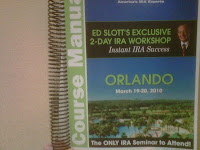 One of the perks of attending Ed Slott's 2-Day IRA Workshop is receiving the detailed 400-plus-page course manual. Each page of the manual is chalk full of information, and maybe just as important, examples to illustrate certain IRA rules.
One of the perks of attending Ed Slott's 2-Day IRA Workshop is receiving the detailed 400-plus-page course manual. Each page of the manual is chalk full of information, and maybe just as important, examples to illustrate certain IRA rules.You not only have a great notetaking tool and manual to follow along with during the presentation, but a lifelong reference guide when a question or issue arises with your clients.
Good Morning From Orlando!

Good morning and welcome to Ed Slott's 2-Day IRA Workshop, Instant IRA Success, at the Hyatt Regency International Airport Hotel in Orlando, Florida.
We will be posting pictures and information throughout the day from Orlando.
Thursday, March 18, 2010
Slott Report Mailbag: March 18th
LIVE from Orlando, here is another installment of The Slott Report Mailbag.
1.
Dear Mr. Slott and Company,
Not surprisingly, there is certainly a fair amount of inconsistency among different sources as to the rules regarding Roths. Can you pay part of the conversion taxes in 2010 and the rest in 2011/2012? Are the income limits lifted for only 2010 or are they lifted indefinitely? (Until further notice, they are lifted beyond 2010).
But here's a vexing question that I can't get consistent answers to! Under what circumstances is an inherited Roth IRA subject to estate taxes if it's left to beneficiaries? Is the Roth considered part of the taxable estate, or does it escape estate tax altogether?
Or does the answer depend on certain circumstances?
What is the best answer, and why does there seem to be a lot of inconsistency about this matter?
Thanks much!
Howard S. Sample
Toledo, Ohio
Answer:
An inherited Roth IRA is always part of your taxable estate. While distributions from the inherited Roth account are income tax-free, they are NOT estate tax-free if the overall estate is subject to estate tax. The federal estate tax has been eliminated, so far, for 2010.
2.
I received a distribution of stock from my IRA. The cost of the stock in the IRA was about $18,000 and the value on the date of distribution was about $13,000. What is the basis to me of the stock distributed? Is it $13,000 or $18,000? Thanks.
Ken
Answer:
Your cost basis of the stock you received as a distribution from the IRA is the fair market value on the date of the distribution. This will be the gross distribution amount in box 1 on the 1099-R you will receive.
3.
My IRA was converted to a Roth in 2009. An RMD is required in 2010. A portion of the 2009 conversion is recharacterized in 2010. What amount is the 2010 RMD based on?
Answer:
The required minimum distribution for 2010 is based on the value as of 12/31/09. Since you are doing a partial recharacterization, you will have to do 2 net income calculations, one for the recharacterization and one to determine the 12/31 value. The formula for this calculation is in IRS Publication 590.
By IRA Technical Consultant Marvin Rotenberg and Jared Trexler
------------------------------------------------------------------------------
Comment, Question, Discussion Topic on your mind? Click on the Blue Comment Link below and leave your thoughts then check back to see what other consumers and advisors think.
*Copyright 2010 Ed Slott and Company, LLC
1.
Dear Mr. Slott and Company,
Not surprisingly, there is certainly a fair amount of inconsistency among different sources as to the rules regarding Roths. Can you pay part of the conversion taxes in 2010 and the rest in 2011/2012? Are the income limits lifted for only 2010 or are they lifted indefinitely? (Until further notice, they are lifted beyond 2010).
But here's a vexing question that I can't get consistent answers to! Under what circumstances is an inherited Roth IRA subject to estate taxes if it's left to beneficiaries? Is the Roth considered part of the taxable estate, or does it escape estate tax altogether?
Or does the answer depend on certain circumstances?
What is the best answer, and why does there seem to be a lot of inconsistency about this matter?
Thanks much!
Howard S. Sample
Toledo, Ohio
Answer:
An inherited Roth IRA is always part of your taxable estate. While distributions from the inherited Roth account are income tax-free, they are NOT estate tax-free if the overall estate is subject to estate tax. The federal estate tax has been eliminated, so far, for 2010.
2.
I received a distribution of stock from my IRA. The cost of the stock in the IRA was about $18,000 and the value on the date of distribution was about $13,000. What is the basis to me of the stock distributed? Is it $13,000 or $18,000? Thanks.
Ken
Answer:
Your cost basis of the stock you received as a distribution from the IRA is the fair market value on the date of the distribution. This will be the gross distribution amount in box 1 on the 1099-R you will receive.
3.
My IRA was converted to a Roth in 2009. An RMD is required in 2010. A portion of the 2009 conversion is recharacterized in 2010. What amount is the 2010 RMD based on?
Answer:
The required minimum distribution for 2010 is based on the value as of 12/31/09. Since you are doing a partial recharacterization, you will have to do 2 net income calculations, one for the recharacterization and one to determine the 12/31 value. The formula for this calculation is in IRS Publication 590.
By IRA Technical Consultant Marvin Rotenberg and Jared Trexler
------------------------------------------------------------------------------
Comment, Question, Discussion Topic on your mind? Click on the Blue Comment Link below and leave your thoughts then check back to see what other consumers and advisors think.
*Copyright 2010 Ed Slott and Company, LLC
Wednesday, March 17, 2010
The Wrong Beneficiary -- Can a Disclaimer Help?
The IRA owner has died. Only one individual is named on the beneficiary form, let’s call him David. He wants to do the right thing and share the IRA with his siblings or the other individuals who should have had a share of the IRA. I know, it is hard to believe but some beneficiaries do want to do the right thing!
So, what can David do? Frequently, beneficiaries look to do a disclaimer. If David disclaims the IRA he will be treated as though he died before the account owner. For many assets, that would mean the asset passes in accordance with the terms of the will. That does not always happen in the case of an IRA.
After David disclaims the IRA, you have to look at the beneficiary form. If there is a contingent beneficiary named, that is who will inherit the IRA after the disclaimer. When there is no contingent beneficiary, then you have to look at the default language in the IRA agreement. Some agreements will say that if there is no beneficiary then the account goes to the spouse, if there is no spouse the account will go to the children. Many IRA agreements will say that if there is no beneficiary, then the account will pass in accordance with the will.
Bottom line, before you disclaim an IRA, you need to know where it will go. The beneficiary cannot direct where the asset goes when he disclaims. Since a disclaimer is a legal document, you should also consult with an attorney familiar with disclaimers to ensure that you meet all the necessary requirements of a qualified disclaimer.
By IRA Technical Consultant Beverly DeVeny and Jared Trexler
------------------------------------------------------------------------------
Comment, Question, Discussion Topic on your mind? Click on the Blue Comment Link below and leave your thoughts then check back to see what other consumers and advisors think.
*Copyright 2010 Ed Slott and Company, LLC
So, what can David do? Frequently, beneficiaries look to do a disclaimer. If David disclaims the IRA he will be treated as though he died before the account owner. For many assets, that would mean the asset passes in accordance with the terms of the will. That does not always happen in the case of an IRA.
After David disclaims the IRA, you have to look at the beneficiary form. If there is a contingent beneficiary named, that is who will inherit the IRA after the disclaimer. When there is no contingent beneficiary, then you have to look at the default language in the IRA agreement. Some agreements will say that if there is no beneficiary then the account goes to the spouse, if there is no spouse the account will go to the children. Many IRA agreements will say that if there is no beneficiary, then the account will pass in accordance with the will.
Bottom line, before you disclaim an IRA, you need to know where it will go. The beneficiary cannot direct where the asset goes when he disclaims. Since a disclaimer is a legal document, you should also consult with an attorney familiar with disclaimers to ensure that you meet all the necessary requirements of a qualified disclaimer.
By IRA Technical Consultant Beverly DeVeny and Jared Trexler
------------------------------------------------------------------------------
Comment, Question, Discussion Topic on your mind? Click on the Blue Comment Link below and leave your thoughts then check back to see what other consumers and advisors think.
*Copyright 2010 Ed Slott and Company, LLC
Welcome to Ed Slott's 2-Day IRA Workshop
 Ed Slott's 2-Day IRA Workshop begins THIS FRIDAY at the Hyatt Regency Orlando International Airport Hotel. We at The Slott Report arrived early this afternoon -- after an hour-plus delay at Philadelphia International Airport.
Ed Slott's 2-Day IRA Workshop begins THIS FRIDAY at the Hyatt Regency Orlando International Airport Hotel. We at The Slott Report arrived early this afternoon -- after an hour-plus delay at Philadelphia International Airport.We were welcomed by overcast skies -- they call this the Sunshine State?!? -- and cool temperatures. The Slott Report will be providing photos, commentary and some IRA tidbits throughout the week from Orlando, so bookmark this site and check back for more, including information on our fall 2-Day IRA Workshop.
Tuesday, March 16, 2010
Retirement Fears: Pitch vs. Reality
As a consumer, it is important to distinguish a "sales pitch" from "reality" when dealing with your financial security in the present and going forward.
This installment of Retirement Fears looks at 3 different sales pitches and the aftermath of their false promises. At the end of the piece, we detail 4 ways to avoid this trouble.
CLICK HERE to read Retirement Fears.
This installment of Retirement Fears looks at 3 different sales pitches and the aftermath of their false promises. At the end of the piece, we detail 4 ways to avoid this trouble.
CLICK HERE to read Retirement Fears.
Monday, March 15, 2010
Ed Slott on the Road: Week of March 15th
Ed Slott will be on the road this week -- and The Slott Report will have pictures to prove it. Below is Ed's speaking schedule for this week, and as always, you can CLICK HERE to view his entire 2010 whereabouts.
There is still time to register for the Orlando event! CLICK HERE to register or call 866-337-5688.
- Ed will be speaking to Nationwide in Melville, New York on Tuesday, March 16th
- Ed Slott's 2-Day IRA Workshop, Instant IRA Success, will take place on Friday, March 19th and Saturday, March 20th at the Hyatt Regency International Airport Hotel in Orlando, Florida.
There is still time to register for the Orlando event! CLICK HERE to register or call 866-337-5688.
Friday, March 12, 2010
NEW Blog Look for 2-Day IRA Workshop
We put our best foot forward to make Ed Slott and Company's 2-Day IRA Workshop a complete learning experience.
That is why The Slott Report will be traveling to Orlando, Florida and bringing you tidbits of important information, pictures and daily blog posts from the 2-Day IRA Workshop on March 19-20 at the Hyatt Regency Orlando International Airport Hotel in sunny -- but at the moment quite cool -- Florida.
This is what you can expect in this space from next Wednesday-Saturday LIVE from Orlando.
CLICK HERE to Register for the March 19th and 20th workshop.
See you in Orlando!
That is why The Slott Report will be traveling to Orlando, Florida and bringing you tidbits of important information, pictures and daily blog posts from the 2-Day IRA Workshop on March 19-20 at the Hyatt Regency Orlando International Airport Hotel in sunny -- but at the moment quite cool -- Florida.
This is what you can expect in this space from next Wednesday-Saturday LIVE from Orlando.
- Pictures posted daily from the 2-Day IRA Workshop in Orlando
- Daily posts complete with information chronicling each day at the 2-Day IRA Workshop
- NEW information on our next 2-Day IRA Workshop -- heard first RIGHT HERE!
- Still the same weekly blog schedule -- including The Slott Report Mailbag and IRA articles from our IRA Technical Consultants
- References to our entire social network -- How to Join Us on Twitter, Facebook and Linkedin to make sure you are getting the latest IRA and company information
CLICK HERE to Register for the March 19th and 20th workshop.
See you in Orlando!
Thursday, March 11, 2010
Slott Report Mailbag: March 11th
It is time for another Slott Report Mailbag with 3 consumer questions and answers from our team of IRA Technical Consultants.
1.
Ed and Company,
I am 88 years old and in poor health. While trying to simplify my Vanguard IRA online (for my wife's benefit), I made a gross error. In trying to consolidate 3 bond funds into one, I clicked on the wrong instruction resulting in the funds being sent to me as a distribution rather than being used to purchase another fund. I returned these checks as soon as I received them, payable to my account with Vanguard. The checks were in my possession for a total of 17 hours.
I know these checks could be considered as a rollover. However, less than 12 months ago, I did a planned rollover to my Vanguard IRA. Since I returned the checks immediately without cashing them, and because of my age and infirmity, how would I go about having the 'rollover' voided? I am able to document every step of the way.
Would appreciate I response.
Thanks!
Answer:
If any of the bond money came out of the account that received your earlier rollover it would not be eligible to go back into any IRA. You might want to check with Vanguard to see if any of these transfers violate the once per year rule.
2.
Can you withdraw Roth IRA money if you are 70 years old to pay life insurance premiums tax free?
Thanks,
Elmer
Answer:
You can always take a distribution of basis from the Roth IRA. Basis is annual contributions and converted amounts. Those distributions will not be taxed when they are withdrawn as they were subject to tax when they went into the Roth IRA.
You must have had a Roth IRA opened for 5 years to be able to avoid a penalty and income tax on the earnings (the amount over the contribution amount and/or converted amount). You also must be age 59 1/2 or older, which you are. Once you take money out of the Roth IRA you can do anything with it, including paying for life insurance.
3.
Regarding Roth IRA conversions in 2010, if you are planning a conversion and you have two accounts 1)A traditional IRA that includes after-tax contributions and 2)an employer-sponsored SIMPLE IRA (have not met 2-year holding period). Will the SIMPLE IRA balance have to be included in the basis calculation since it isn't eligible for conversion?
Thank you!
Cindy
Answer:
SIMPLE IRAs MUST be included in the pro-rata rule calculation even if they are not eligible for conversion.
By IRA Technical Consultant Marvin Rotenberg and Jared Trexler
------------------------------------------------------------------------------
Comment, Question, Discussion Topic on your mind? Click on the Blue Comment Link below and leave your thoughts then check back to see what other consumers and advisors think.
*Copyright 2010 Ed Slott and Company, LLC
1.
Ed and Company,
I am 88 years old and in poor health. While trying to simplify my Vanguard IRA online (for my wife's benefit), I made a gross error. In trying to consolidate 3 bond funds into one, I clicked on the wrong instruction resulting in the funds being sent to me as a distribution rather than being used to purchase another fund. I returned these checks as soon as I received them, payable to my account with Vanguard. The checks were in my possession for a total of 17 hours.
I know these checks could be considered as a rollover. However, less than 12 months ago, I did a planned rollover to my Vanguard IRA. Since I returned the checks immediately without cashing them, and because of my age and infirmity, how would I go about having the 'rollover' voided? I am able to document every step of the way.
Would appreciate I response.
Thanks!
Answer:
If any of the bond money came out of the account that received your earlier rollover it would not be eligible to go back into any IRA. You might want to check with Vanguard to see if any of these transfers violate the once per year rule.
2.
Can you withdraw Roth IRA money if you are 70 years old to pay life insurance premiums tax free?
Thanks,
Elmer
Answer:
You can always take a distribution of basis from the Roth IRA. Basis is annual contributions and converted amounts. Those distributions will not be taxed when they are withdrawn as they were subject to tax when they went into the Roth IRA.
You must have had a Roth IRA opened for 5 years to be able to avoid a penalty and income tax on the earnings (the amount over the contribution amount and/or converted amount). You also must be age 59 1/2 or older, which you are. Once you take money out of the Roth IRA you can do anything with it, including paying for life insurance.
3.
Regarding Roth IRA conversions in 2010, if you are planning a conversion and you have two accounts 1)A traditional IRA that includes after-tax contributions and 2)an employer-sponsored SIMPLE IRA (have not met 2-year holding period). Will the SIMPLE IRA balance have to be included in the basis calculation since it isn't eligible for conversion?
Thank you!
Cindy
Answer:
SIMPLE IRAs MUST be included in the pro-rata rule calculation even if they are not eligible for conversion.
By IRA Technical Consultant Marvin Rotenberg and Jared Trexler
------------------------------------------------------------------------------
Comment, Question, Discussion Topic on your mind? Click on the Blue Comment Link below and leave your thoughts then check back to see what other consumers and advisors think.
*Copyright 2010 Ed Slott and Company, LLC
Wednesday, March 10, 2010
Swapping Out IRA Assets For Personal Assets
This question comes up frequently, usually in conjunction with a Roth IRA. The account owner wants to trade an asset inside the IRA or Roth IRA for an asset owned outside of the IRA. There are two general variations here. One is that the asset is expected to appreciate greatly, in which case the owner wants to get it into a Roth IRA so the appreciation will never be taxed. The other is that the asset has lost value and may continue to do so, in which case the owner wants it out of the IRA so they can take a deduction for the loss.
In either case, the answer is the same. You cannot self deal with your IRA. You cannot exchange assets with your IRA. In fact, the only contributions that can be made to an IRA or Roth IRA are cash (and you must have earned income in order to make a contribution).
The only time you can put assets other than cash into an IRA is when you are transferring the asset from one IRA or plan to another. In that situation, you must put the same asset you received from the first account into the second account. You cannot take IBM stock out of your IRA and replace it with McDonald’s stock. If you take out IBM stock, you must put IBM stock into the second account.
Any self dealing is a prohibited transaction which will result in a complete distribution of the IRA and the assessment of taxes and penalties, if applicable.
By IRA Technical Consultant Beverly DeVeny and Jared Trexler
------------------------------------------------------------------------------
Comment, Question, Discussion Topic on your mind? Click on the Blue Comment Link below and leave your thoughts then check back to see what other consumers and advisors think.
*Copyright 2010 Ed Slott and Company, LLC
In either case, the answer is the same. You cannot self deal with your IRA. You cannot exchange assets with your IRA. In fact, the only contributions that can be made to an IRA or Roth IRA are cash (and you must have earned income in order to make a contribution).
The only time you can put assets other than cash into an IRA is when you are transferring the asset from one IRA or plan to another. In that situation, you must put the same asset you received from the first account into the second account. You cannot take IBM stock out of your IRA and replace it with McDonald’s stock. If you take out IBM stock, you must put IBM stock into the second account.
Any self dealing is a prohibited transaction which will result in a complete distribution of the IRA and the assessment of taxes and penalties, if applicable.
By IRA Technical Consultant Beverly DeVeny and Jared Trexler
------------------------------------------------------------------------------
Comment, Question, Discussion Topic on your mind? Click on the Blue Comment Link below and leave your thoughts then check back to see what other consumers and advisors think.
*Copyright 2010 Ed Slott and Company, LLC
Tuesday, March 9, 2010
RMDs MUST Be Taken First
One of the many advantages of converting to a Roth IRA is that there are no mandatory required minimum distributions (RMDs) during the account owner's lifetime. This could be a very attractive feature for those who do not need their RMDs to support their lifestyles. Leaving this money inside the Roth IRA alleviates the occurrence of a tax bill, provides the opportunity for continued tax-favored investment growth, and will most likely result in future tax-free distributions.
Many high-income retirees had been counting down the days until 2010 when they finally would be eligible to convert to a Roth IRA. The year 2010 truly is historic in this regard, as it marks the first time anyone can convert to a Roth IRA without being hindered by an income or tax filing restriction. Prior to 2010, individuals with modified adjusted gross incomes over $100,000 or those who filed federal income tax returns under the "married, filing separate" category were prevented from converting to a Roth IRA. These shackles have been removed.
One of the most important steps involved in a Roth conversion is the careful deliberation of whether its perceived positive results (i.e. tax-free growth opportunity) will outweigh the negative aspects, such as an immediate or slightly deferred tax bill. Overall, it needs to be determined if the personal, as well as financial, objectives behind why the individual is considering a conversion will be met. In this regard, individuals must be careful not to act too quickly. For example, in a previous article appearing here we wrote about the return of RMDs in 2010 after having been suspended in 2009. In their haste to act, some IRA owners might jump at the chance to convert their entire account balance in 2010 without realizing that their RMD for the year cannot be converted to a Roth IRA. Individuals age 70 1/2 or older in 2010 must first withdraw their 2010 RMD before they can convert to a Roth IRA. The first dollars distributed from a traditional IRA in a year in which an RMD must be taken are considered payment of such RMD until it is fully satisfied. Once the full RMD for the year is withdrawn, then the remaining IRA balance can be converted.
Mistakenly converting an RMD results in an excess contribution to a Roth IRA, which carries along with it a 6% excise tax penalty for each year the funds remain in the account. The RMD funds withdrawn from the non-Roth IRA can be used to contribute to a Roth IRA, if you otherwise have a like amount of eligible compensation and are able to overcome the income limitations for making such a contribution. That contribution is generally limited to $6,000 if you are age 50 or older, or $5,000 if you're not. The RMD can also be used as a source to help pay the tax on the conversion of the remainder of the non-Roth IRA(s).
The bottom line here is that similar to any other major financial decision in one's life, the question of whether to convert to a Roth IRA needs to be measured carefully and with all the facts. Only then can the best course of action be identified and implemented.
By IRA Technical Consultant Marvin Rotenberg and Jared Trexler
------------------------------------------------------------------------------
Comment, Question, Discussion Topic on your mind? Click on the Blue Comment Link below and leave your thoughts then check back to see what other consumers and advisors think.
*Copyright 2010 Ed Slott and Company, LLC
Many high-income retirees had been counting down the days until 2010 when they finally would be eligible to convert to a Roth IRA. The year 2010 truly is historic in this regard, as it marks the first time anyone can convert to a Roth IRA without being hindered by an income or tax filing restriction. Prior to 2010, individuals with modified adjusted gross incomes over $100,000 or those who filed federal income tax returns under the "married, filing separate" category were prevented from converting to a Roth IRA. These shackles have been removed.
One of the most important steps involved in a Roth conversion is the careful deliberation of whether its perceived positive results (i.e. tax-free growth opportunity) will outweigh the negative aspects, such as an immediate or slightly deferred tax bill. Overall, it needs to be determined if the personal, as well as financial, objectives behind why the individual is considering a conversion will be met. In this regard, individuals must be careful not to act too quickly. For example, in a previous article appearing here we wrote about the return of RMDs in 2010 after having been suspended in 2009. In their haste to act, some IRA owners might jump at the chance to convert their entire account balance in 2010 without realizing that their RMD for the year cannot be converted to a Roth IRA. Individuals age 70 1/2 or older in 2010 must first withdraw their 2010 RMD before they can convert to a Roth IRA. The first dollars distributed from a traditional IRA in a year in which an RMD must be taken are considered payment of such RMD until it is fully satisfied. Once the full RMD for the year is withdrawn, then the remaining IRA balance can be converted.
Mistakenly converting an RMD results in an excess contribution to a Roth IRA, which carries along with it a 6% excise tax penalty for each year the funds remain in the account. The RMD funds withdrawn from the non-Roth IRA can be used to contribute to a Roth IRA, if you otherwise have a like amount of eligible compensation and are able to overcome the income limitations for making such a contribution. That contribution is generally limited to $6,000 if you are age 50 or older, or $5,000 if you're not. The RMD can also be used as a source to help pay the tax on the conversion of the remainder of the non-Roth IRA(s).
The bottom line here is that similar to any other major financial decision in one's life, the question of whether to convert to a Roth IRA needs to be measured carefully and with all the facts. Only then can the best course of action be identified and implemented.
By IRA Technical Consultant Marvin Rotenberg and Jared Trexler
------------------------------------------------------------------------------
Comment, Question, Discussion Topic on your mind? Click on the Blue Comment Link below and leave your thoughts then check back to see what other consumers and advisors think.
*Copyright 2010 Ed Slott and Company, LLC
Monday, March 8, 2010
Ed Slott on The Road: Week of March 8th
Ed Slott is making his way around the country this week, gearing up for our 2-Day IRA Workshop, Instant IRA Success, on March 19-20 in Orlando, Florida.
Here is Ed's speaking schedule this week. If your business is interested in bringing in Ed to speak, please contact Laurin Levine at 516-536-8282.
Here is Ed's speaking schedule this week. If your business is interested in bringing in Ed to speak, please contact Laurin Levine at 516-536-8282.
- Live on-air pledge drive Public Television (LPB) Baton Rouge, LA TODAY, March 8th
- JCN Financial Advisory Group, LLC on Tuesday, March 9th in Baton Rouge, LA
- Natonwide on Friday, March 12th in Hartford, CT
Ed Slott's 2-Day IRA Workshop in Orlando
Ed Slott's 2-Day IRA Workshop, Instant IRA Success, will take place on March 19-20 at the Hyatt Regency Orlando International Airport Hotel.
THERE IS STILL TIME TO REGISTER! CLICK HERE for more information and to register for the 2-Day IRA Workshop in Orlando.
THERE IS STILL TIME TO REGISTER! CLICK HERE for more information and to register for the 2-Day IRA Workshop in Orlando.
Friday, March 5, 2010
Retirement Decisions Guide Sneak Peak (5 of 5)
Ed Slott's Retirement Decisions Guide is a compact 47-page educational guide with 86 detailed ways to Save & Stretch Your Wealth. It is a perfect refresher and resource guide for financial advisors and a great educational tool for consumers nationwide.
CLICK HERE to order a single copy or take advantage of our bulk discounts. Media members can inquire about review copies by calling Jared Trexler at 215-557-7022.
Below is the fifth excerpt from the book.
80. Give a grandchild a cool $2.3 million
Most people who own a Traditional IRA assume they will spend down their account over the course of their lifetime. That's because the IRS requires owners a Traditional IRA to take minimum distributions each year starting at age 70 1/2. But here's a secret: The size of that distribution is based on IRS life-expectancy tables, which have you living much longer than standard actuarial tables. That's a good thing--meaning that assets will likely be left over in your Traditional IRA when you die if you take only the minimum required each year.
CLICK HERE to order a single copy or take advantage of our bulk discounts. Media members can inquire about review copies by calling Jared Trexler at 215-557-7022.
Below is the fifth excerpt from the book.
80. Give a grandchild a cool $2.3 million
Most people who own a Traditional IRA assume they will spend down their account over the course of their lifetime. That's because the IRS requires owners a Traditional IRA to take minimum distributions each year starting at age 70 1/2. But here's a secret: The size of that distribution is based on IRS life-expectancy tables, which have you living much longer than standard actuarial tables. That's a good thing--meaning that assets will likely be left over in your Traditional IRA when you die if you take only the minimum required each year.
- Ed Slott's advice: Name one or more grandchildren the beneficiary of your Traditional IRA, and their inheritance could turn into millions of dollars. That's because a one-year-old's life expectancy is lengthy, and the amount that must be withdrawn annually from the Inherited IRA will be infinitesimal. So, a $100,000 IRA earning 6% annually will pay that child more than $2.3 million over 80 years.
Thursday, March 4, 2010
Slott Report Mailbag: March 4th
It is time for another Slott Report Mailbag with 3 consumer questions and answers from the IRA Technical Experts at Ed Slott and Company.
1.
Hi Ed,
I have an inactive 401(k) that has about $200,000 of "after-tax" assets which includes about $75,000 of after-tax contributions and $125,000 of earnings on the after-tax contributions (the account also holds some pre-tax assets as well). The plan administrator indicated I can distribute these funds anyway I wish as long as I take the after-tax contributions and its pro-rata earnings at the same time. Will the IRS let me split the $75,000 into a new Roth IRA and then divert the $125,000 into an existing Rollover IRA and avoid paying any tax? Or, does the whole $200,000 need to be put in the Roth triggering tax on the $175,000 income component? No one seems to know a definitive answer to this.
Thank you,
Lewis Gridley
Answer:
Unfortunately, there is no real answer at this time. We hope that the IRS will address this issue in the near future. Currently the thinking is that the pro-rate rule will apply.
2.
I converted a partial amount of my Traditional IRAs over to a Roth IRA in 2009. I had some non-deductible IRAs in prior years. I'm filling out Form 8606, and line 6 states "Enter the value of all your traditional, SEP, and Simple IRAs as of December 31, 2009. My Traditional IRA statement for 2009 lists an:
Answer:
Form 5498 is the form your custodian will send to the IRS indicating the year-end balance. This form is issued in May. You will also receive a copy of Form 5498. You might want to wait for this year's form before finalizing your return or you can look at last year's form to see what was reported; the year-end value or the fair market value. You also might want to call your custodian and ask them for help.
3.
For income tax purposes on a conversion to Roth: My tax table rate is 25% but my actual rate is closer to 16-17% with deductions. Will my conversion rate be a flat 25% or will it adjust downward as other income does? Thank you.
I have the book "The Retirement Savings Time Bomb" and have learned a great deal.
Thanks,
Bart Henkle
Answer:
I'm glad you enjoyed reading the book and that you found it informative. On your Roth conversion; the amount of converted dollars, assuming it is all pre-tax dollars, will be added to your income and whatever tax bracket it falls in will be how it will be taxed. It is not a flat 25%, it will depend on your final bracket. If you convert in 2010, you could choose to add the total conversion amount on your 2010 tax return or you can add half of the converted amount to your 2011 return and add the other half to your 2012 return.
By IRA Technical Consultant Marvin Rotenberg and Jared Trexler
------------------------------------------------------------------------------
Comment, Question, Discussion Topic on your mind? Click on the Blue Comment Link below and leave your thoughts then check back to see what other consumers and advisors think.
*Copyright 2010 Ed Slott and Company, LLC
1.
Hi Ed,
I have an inactive 401(k) that has about $200,000 of "after-tax" assets which includes about $75,000 of after-tax contributions and $125,000 of earnings on the after-tax contributions (the account also holds some pre-tax assets as well). The plan administrator indicated I can distribute these funds anyway I wish as long as I take the after-tax contributions and its pro-rata earnings at the same time. Will the IRS let me split the $75,000 into a new Roth IRA and then divert the $125,000 into an existing Rollover IRA and avoid paying any tax? Or, does the whole $200,000 need to be put in the Roth triggering tax on the $175,000 income component? No one seems to know a definitive answer to this.
Thank you,
Lewis Gridley
Answer:
Unfortunately, there is no real answer at this time. We hope that the IRS will address this issue in the near future. Currently the thinking is that the pro-rate rule will apply.
2.
I converted a partial amount of my Traditional IRAs over to a Roth IRA in 2009. I had some non-deductible IRAs in prior years. I'm filling out Form 8606, and line 6 states "Enter the value of all your traditional, SEP, and Simple IRAs as of December 31, 2009. My Traditional IRA statement for 2009 lists an:
- Ending balance 12-31-09 of $6690
- Fair market value of $7528
Answer:
Form 5498 is the form your custodian will send to the IRS indicating the year-end balance. This form is issued in May. You will also receive a copy of Form 5498. You might want to wait for this year's form before finalizing your return or you can look at last year's form to see what was reported; the year-end value or the fair market value. You also might want to call your custodian and ask them for help.
3.
For income tax purposes on a conversion to Roth: My tax table rate is 25% but my actual rate is closer to 16-17% with deductions. Will my conversion rate be a flat 25% or will it adjust downward as other income does? Thank you.
I have the book "The Retirement Savings Time Bomb" and have learned a great deal.
Thanks,
Bart Henkle
Answer:
I'm glad you enjoyed reading the book and that you found it informative. On your Roth conversion; the amount of converted dollars, assuming it is all pre-tax dollars, will be added to your income and whatever tax bracket it falls in will be how it will be taxed. It is not a flat 25%, it will depend on your final bracket. If you convert in 2010, you could choose to add the total conversion amount on your 2010 tax return or you can add half of the converted amount to your 2011 return and add the other half to your 2012 return.
By IRA Technical Consultant Marvin Rotenberg and Jared Trexler
------------------------------------------------------------------------------
Comment, Question, Discussion Topic on your mind? Click on the Blue Comment Link below and leave your thoughts then check back to see what other consumers and advisors think.
*Copyright 2010 Ed Slott and Company, LLC
Retirement Decisions Guide Sneak Peak (4 of 5)
Ed Slott's Retirement Decisions Guide is a compact 47-page educational guide with 86 detailed ways to Save & Stretch Your Wealth. It is a perfect refresher and resource guide for financial advisors and a great educational tool for consumers nationwide.
CLICK HERE to order a single copy or take advantage of our bulk discounts. Media members can inquire about review copies by calling Jared Trexler at 215-557-7022.
Below is the fourth excerpt from the book.
73. Secrets of healthy family meetings
When you hold a family meting with your financial advisor, draft questions and concerns in advance. Your children should know how to contact your life insurance representative, financial planners, accountants, and attorneys. In the meeting, note how the advisors respond to your children. This is a good indicator as to how helpful these advisors will be to your children in the future.
Compiled by Jared Trexler
------------------------------------------------------------------------------
Comment, Question, Discussion Topic on your mind? Click on the Blue Comment Link below and leave your thoughts then check back to see what other consumers and advisors think.
*Copyright 2010 Ed Slott and Company, LLC
CLICK HERE to order a single copy or take advantage of our bulk discounts. Media members can inquire about review copies by calling Jared Trexler at 215-557-7022.
Below is the fourth excerpt from the book.
73. Secrets of healthy family meetings
When you hold a family meting with your financial advisor, draft questions and concerns in advance. Your children should know how to contact your life insurance representative, financial planners, accountants, and attorneys. In the meeting, note how the advisors respond to your children. This is a good indicator as to how helpful these advisors will be to your children in the future.
Compiled by Jared Trexler
------------------------------------------------------------------------------
Comment, Question, Discussion Topic on your mind? Click on the Blue Comment Link below and leave your thoughts then check back to see what other consumers and advisors think.
*Copyright 2010 Ed Slott and Company, LLC
Wednesday, March 3, 2010
Warning to Those Who do Their Own Taxes
Do you do your own taxes? Do you use a tax program such as Turbo Tax? Did you do a Roth conversion or make a Roth contribution last year?
This is not 20 questions (we promise), we only asked three. And they all result from a real-life situation that recently came to our attention.
The taxpayer did small Roth conversions in 2008 and 2009. He prepares his own tax returns. The tax software spit out a Form 5329 for the 2008 return. He couldn't see why this form was generated so he ignored the form, finalized the return and submitted it to IRS. When the same form showed up for his 2009 return, he called his advisor to ask why this form might show up.
The answer was simple. He made too much money to qualify for a Roth conversion. Now he has a problem. He must recharacterize his 2009 conversion by October 15, 2010. The problem lies with his 2008 conversion. It is too late to recharacterize it (unless he requests a PLR from IRS which comes with a $4,000 IRS fee). The funds are considered an excess contribution to the Roth IRA and are subject to a penalty of 6% for each year that they remain in the Roth account. By ignoring the form, the taxpayer has put himself into the penalty box.
Don't let this happen to you. Do not ignore those odd forms generated by your tax preparation software. Consult with an advisor before the situation puts you in the penalty box.
By IRA Technical Consultant Beverly DeVeny and Jared Trexler
------------------------------------------------------------------------------
Comment, Question, Discussion Topic on your mind? Click on the Blue Comment Link below and leave your thoughts then check back to see what other consumers and advisors think.
*Copyright 2010 Ed Slott and Company, LLC
This is not 20 questions (we promise), we only asked three. And they all result from a real-life situation that recently came to our attention.
The taxpayer did small Roth conversions in 2008 and 2009. He prepares his own tax returns. The tax software spit out a Form 5329 for the 2008 return. He couldn't see why this form was generated so he ignored the form, finalized the return and submitted it to IRS. When the same form showed up for his 2009 return, he called his advisor to ask why this form might show up.
The answer was simple. He made too much money to qualify for a Roth conversion. Now he has a problem. He must recharacterize his 2009 conversion by October 15, 2010. The problem lies with his 2008 conversion. It is too late to recharacterize it (unless he requests a PLR from IRS which comes with a $4,000 IRS fee). The funds are considered an excess contribution to the Roth IRA and are subject to a penalty of 6% for each year that they remain in the Roth account. By ignoring the form, the taxpayer has put himself into the penalty box.
Don't let this happen to you. Do not ignore those odd forms generated by your tax preparation software. Consult with an advisor before the situation puts you in the penalty box.
By IRA Technical Consultant Beverly DeVeny and Jared Trexler
------------------------------------------------------------------------------
Comment, Question, Discussion Topic on your mind? Click on the Blue Comment Link below and leave your thoughts then check back to see what other consumers and advisors think.
*Copyright 2010 Ed Slott and Company, LLC
Retirement Decisions Guide Sneak Peak (3 of 5)
Ed Slott's Retirement Decisions Guide is a compact 47-page educational guide with 86 detailed ways to Save & Stretch Your Wealth. It is a perfect refresher and resource guide for financial advisors and a great educational tool for consumers nationwide.
CLICK HERE to order a single copy or take advantage of our bulk discounts. Media members can inquire about review copies by calling Jared Trexler at 215-557-7022.
Below is the third excerpt from the book.
51. What's an annuity?
An annuity is purchased through an insurance company and guarantees the owner monthly cash payments over a set number of years--or until death. An annuity can be purchased with a guaranteed death benefit--which means if you die, your beneficiaries will receive at least what you paid in premiums.
Compiled by Jared Trexler
------------------------------------------------------------------------------
Comment, Question, Discussion Topic on your mind? Click on the Blue Comment Link below and leave your thoughts then check back to see what other consumers and advisors think.
*Copyright 2010 Ed Slott and Company, LLC
CLICK HERE to order a single copy or take advantage of our bulk discounts. Media members can inquire about review copies by calling Jared Trexler at 215-557-7022.
Below is the third excerpt from the book.
51. What's an annuity?
An annuity is purchased through an insurance company and guarantees the owner monthly cash payments over a set number of years--or until death. An annuity can be purchased with a guaranteed death benefit--which means if you die, your beneficiaries will receive at least what you paid in premiums.
Compiled by Jared Trexler
------------------------------------------------------------------------------
Comment, Question, Discussion Topic on your mind? Click on the Blue Comment Link below and leave your thoughts then check back to see what other consumers and advisors think.
*Copyright 2010 Ed Slott and Company, LLC
Tuesday, March 2, 2010
Ed Slott on The Road
Ed Slott is on the road again this week, beginning yesterday when he spoke to American Equity Investment Life Insurance Company in Las Vegas.
For the rest of the week, Ed will speak to:
CLICK HERE to see where Ed is speaking next. If your company is interested in bringing Ed in to speak, please contact Laurin Levine at 516-536-8282.
For the rest of the week, Ed will speak to:
- Jackson National on March 4th in Fort Lauderdale
- Public Television Pledge Drives in Chicago (March 6th), Raleigh, NC (March 7th) and Baton Rouge (March 8th)
CLICK HERE to see where Ed is speaking next. If your company is interested in bringing Ed in to speak, please contact Laurin Levine at 516-536-8282.
Retirement Fears: Not a Role Model
Not all celebrities should be considered role models. Some wealthy individuals in the spotlight feel they are above the law, above their employees, above recourse for their actions.
Case and point: former Pro Bowl quarterback and current Philadelphia Eagles signal-caller Michael Vick. The gifted track star with pads has been in the news more for his transgressions over the past year-plus than his play on the field.
This story is no different. It is a cautionary tale of working for or with a famous individual, and it points at the mindset of Vick as he tries to rehabilitate his image. Read with caution and remember to have a competent, educated financial advisor on your side to protect all of the financial assets you deserve.
CLICK HERE to read this installment of Retirement Fears.
Compiled by Jared Trexler
------------------------------------------------------------------------------
Comment, Question, Discussion Topic on your mind? Click on the Blue Comment Link below and leave your thoughts then check back to see what other consumers and advisors think.
*Copyright 2010 Ed Slott and Company, LLC
Case and point: former Pro Bowl quarterback and current Philadelphia Eagles signal-caller Michael Vick. The gifted track star with pads has been in the news more for his transgressions over the past year-plus than his play on the field.
This story is no different. It is a cautionary tale of working for or with a famous individual, and it points at the mindset of Vick as he tries to rehabilitate his image. Read with caution and remember to have a competent, educated financial advisor on your side to protect all of the financial assets you deserve.
CLICK HERE to read this installment of Retirement Fears.
Compiled by Jared Trexler
------------------------------------------------------------------------------
Comment, Question, Discussion Topic on your mind? Click on the Blue Comment Link below and leave your thoughts then check back to see what other consumers and advisors think.
*Copyright 2010 Ed Slott and Company, LLC
Retirement Decisions Guide Sneak Peak (2 of 5)
This week, The Slott Report is offering a sneak peak at Ed Slott's Retirement Decisions Guide, a 47-page consumer guide that details 86 ways to save and stretch your wealth.
CLICK HERE to order a single copy or take advantage of our bulk discounts. Media members can inquire about review copies by calling Jared Trexler at 215-557-7022.
Below is another excerpt from the book.
No. 16: Who's your IRA beneficiary?
No matter what kind of IRA you own, request a copy of your signed beneficiary form for review. When you receive it, be sure that the people you want to inherit your IRA's assets are listed properly. Also provide your advisor and estate attorney with copies of the signed document.
------------------------------------------------------------------------------
Comment, Question, Discussion Topic on your mind? Click on the Blue Comment Link below and leave your thoughts then check back to see what other consumers and advisors think.
*Copyright 2010 Ed Slott and Company, LLC
CLICK HERE to order a single copy or take advantage of our bulk discounts. Media members can inquire about review copies by calling Jared Trexler at 215-557-7022.
Below is another excerpt from the book.
No. 16: Who's your IRA beneficiary?
No matter what kind of IRA you own, request a copy of your signed beneficiary form for review. When you receive it, be sure that the people you want to inherit your IRA's assets are listed properly. Also provide your advisor and estate attorney with copies of the signed document.
- Reason: When you die, your IRA does not pass according to wishes in your will. Whatever IRA assets are left will pass to the person or persons named in your signed beneficiary document.
------------------------------------------------------------------------------
Comment, Question, Discussion Topic on your mind? Click on the Blue Comment Link below and leave your thoughts then check back to see what other consumers and advisors think.
*Copyright 2010 Ed Slott and Company, LLC
Monday, March 1, 2010
Retirement Decisions Guide Sneak Peak (1 of 5)
This week, The Slott Report will provide sneak peaks at Ed Slott's Retirement Decisions Guide -- a 47-page educational guide that features 86 ways to Save & Stretch Your Wealth.
Each morning, we will include a piece of information from the book along with ways to purchase the powerful IRA guide perfect for both financial advisors, their clients and ANY CONSUMER.
Each book begins with the basics, and Chapter 1, titled "IRA Basics", delves into the foundation of a solid retirement strategy.
Each point in the book is numbered (from 1 to 86) and the third main point is the perfect illustration of information you AND YOUR clients must know to both smartly and purposefully prepare for the financial future.
CLICK HERE to order a single copy or take advantage of our bulk discounts. Media members can inquire about review copies by calling Jared Trexler at 215-557-7022.
Here is the excerpt from Page 3:
3. What are the IRA rules for 2010?
In 2010, there are several important changes in the laws governing IRA contributions, conversions and distributions.
Contribution Levels
------------------------------------------------------------------------------
Comment, Question, Discussion Topic on your mind? Click on the Blue Comment Link below and leave your thoughts then check back to see what other consumers and advisors think.
*Copyright 2010 Ed Slott and Company, LLC
Each morning, we will include a piece of information from the book along with ways to purchase the powerful IRA guide perfect for both financial advisors, their clients and ANY CONSUMER.
Each book begins with the basics, and Chapter 1, titled "IRA Basics", delves into the foundation of a solid retirement strategy.
Each point in the book is numbered (from 1 to 86) and the third main point is the perfect illustration of information you AND YOUR clients must know to both smartly and purposefully prepare for the financial future.
CLICK HERE to order a single copy or take advantage of our bulk discounts. Media members can inquire about review copies by calling Jared Trexler at 215-557-7022.
Here is the excerpt from Page 3:
3. What are the IRA rules for 2010?
In 2010, there are several important changes in the laws governing IRA contributions, conversions and distributions.
Contribution Levels
- Up to age 49 -- $5,000 for 2009 (visit IRAhelp.com/2010 for the 2010 level).
- Age 50 onward -- $6,000 for 2009 (visit IRAhelp.com/2010 for the 2010 level).
- Everyone qualifies to convert a Traditional IRA or SEP IRA to a Roth IRA starting in 2010. There are no longer any income restrictions. The income tax owed on a conversion can be paid in 2010, or the taxable income can be spread equally in 2011 and 2012.
------------------------------------------------------------------------------
Comment, Question, Discussion Topic on your mind? Click on the Blue Comment Link below and leave your thoughts then check back to see what other consumers and advisors think.
*Copyright 2010 Ed Slott and Company, LLC
Subscribe to:
Posts (Atom)
